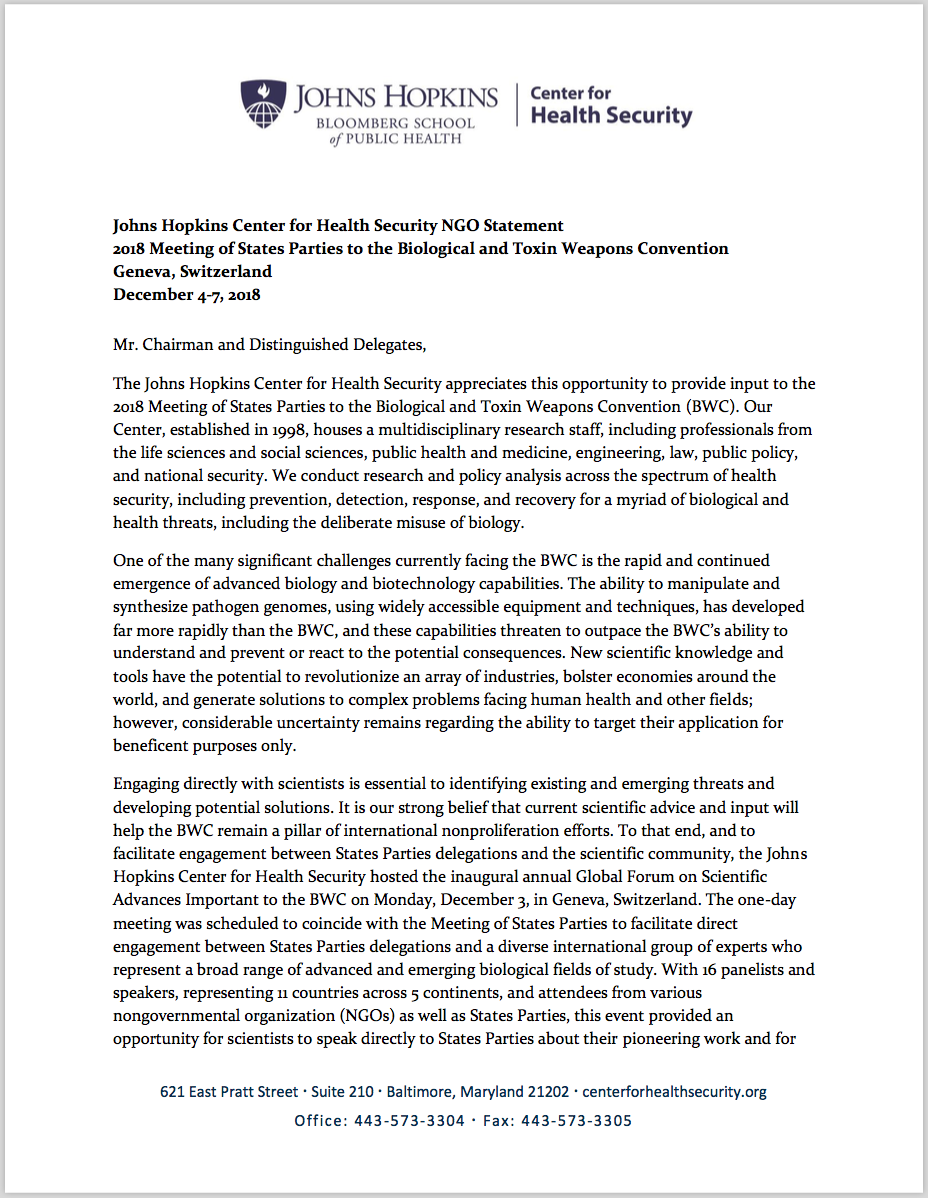In statement to BWC, Center for Health Security says formal engagement with the scientific community, promotion of norms against biological weapons development are “essential”
Center News

December 4, 2018 – A delegation of staff from the Johns Hopkins Center for Health Security is attending the 2018 Meeting of States Parties to the Biological and Toxin Weapons Convention (BWC) at the United Nations in Geneva, Switzerland, from Dec. 4-7, alongside representatives from more than 180 nations that have signed and ratified the treaty.
Invited non-governmental organizations have the opportunity to provide input by submitting a statement. In its statement, the Center stressed the importance of BWC and States Parties engaging with scientists to help identify existing and emerging threats and develop potential solutions, and the value of a collective effort to promulgate the norm against biological weapons development for a new generation.
“Much of advanced scientific research occurs outside the direct purview and oversight of government regulatory programs, so scientists themselves often serve as the first line of defense against the deliberate misuse of biology,” said Director Tom Inglesby, MD, in the Center’s statement submitted Wednesday, Dec. 5. “Formally engaging with scientists to establish and maintain a foundation of support for bioweapons nonproliferation norms within the scientific community is essential to ensuring the continued success of the BWC.”
To support this work, the Center hosted its inaugural Global Forum on Scientific Advances Important to the BWC on Monday, Dec. 3, in Geneva. The one-day meeting will be scheduled annually to coincide with the Meeting of States Parties to facilitate direct engagement between States Parties delegations and a diverse international group of experts who represent a broad range of advanced and emerging biological fields of study.
“We intend for this meeting to be a reliable annual occurrence for future BWC meetings so that the States Parties can remain informed about fast-moving developments in the life sciences that are relevant to the BWC,” said Inglesby.
The Center delivered a similar message about engagement at last year’s meeting.
BWC States Parties meet annually. This year they will consider findings from various BWC reports, among them the report from an August 2018 meeting on developments in the field of science and technology. At that meeting, Gigi Gronvall, PhD, a senior scholar at the Center, presented a paper she co-authored on the implications of advances in gene editing and synthesis technologies.
When it took effect in 1975, the BWC was the first multilateral disarmament treaty to ban an entire category of weapons. The BWC effectively prohibits the development, production, acquisition, transfer, stockpiling, and use of biological and toxin weapons and is a key element in the international community’s efforts to address the proliferation of weapons of mass destruction.
More information about the BWC is available at un.org. More information about the 2018 Meeting of States Parties is available at unog.ch.
About the Johns Hopkins Center for Health Security:
The Johns Hopkins Center for Health Security works to protect people from epidemics and disasters and build resilient communities through innovative scholarship, engagement, and research that strengthens the organizations, systems, policies, and programs essential to preventing and responding to public health crises. The Center is part of the Johns Hopkins Bloomberg School of Public Health and is located in Baltimore, MD.
